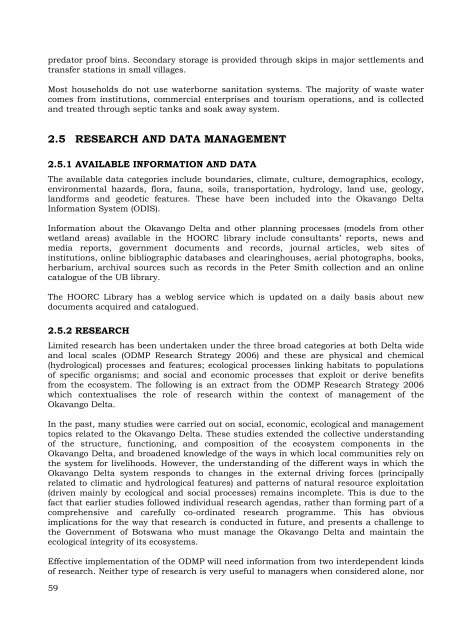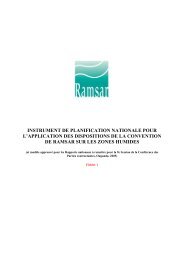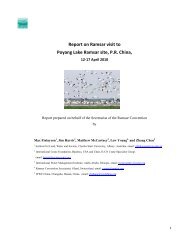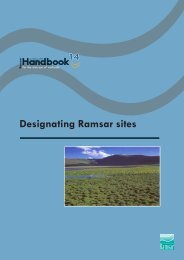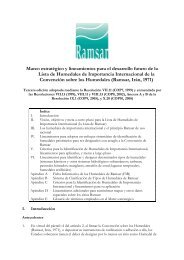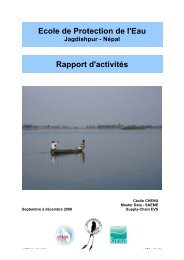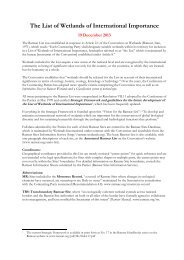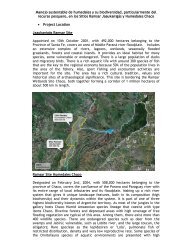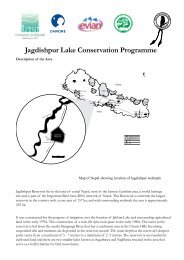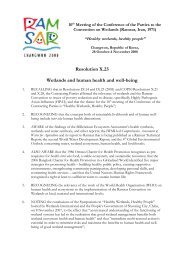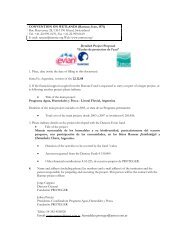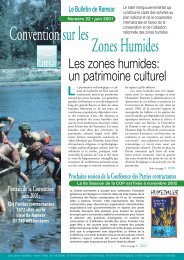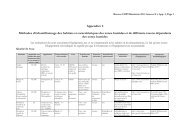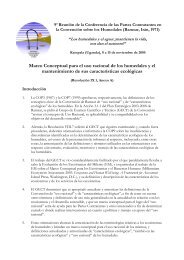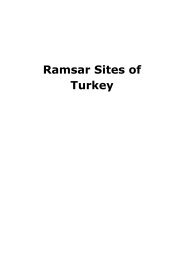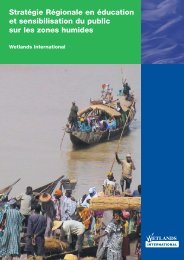Okavango Delta Management Plan - Ramsar Convention on Wetlands
Okavango Delta Management Plan - Ramsar Convention on Wetlands
Okavango Delta Management Plan - Ramsar Convention on Wetlands
You also want an ePaper? Increase the reach of your titles
YUMPU automatically turns print PDFs into web optimized ePapers that Google loves.
predator proof bins. Sec<strong>on</strong>dary storage is provided through skips in major settlements and<br />
transfer stati<strong>on</strong>s in small villages.<br />
Most households do not use waterborne sanitati<strong>on</strong> systems. The majority of waste water<br />
comes from instituti<strong>on</strong>s, commercial enterprises and tourism operati<strong>on</strong>s, and is collected<br />
and treated through septic tanks and soak away system.<br />
2.5 RESEARCH AND DATA MANAGEMENT<br />
2.5.1 AVAILABLE INFORMATION AND DATA<br />
The available data categories include boundaries, climate, culture, demographics, ecology,<br />
envir<strong>on</strong>mental hazards, flora, fauna, soils, transportati<strong>on</strong>, hydrology, land use, geology,<br />
landforms and geodetic features. These have been included into the <str<strong>on</strong>g>Okavango</str<strong>on</strong>g> <str<strong>on</strong>g>Delta</str<strong>on</strong>g><br />
Informati<strong>on</strong> System (ODIS).<br />
Informati<strong>on</strong> about the <str<strong>on</strong>g>Okavango</str<strong>on</strong>g> <str<strong>on</strong>g>Delta</str<strong>on</strong>g> and other planning processes (models from other<br />
wetland areas) available in the HOORC library include c<strong>on</strong>sultants’ reports, news and<br />
media reports, government documents and records, journal articles, web sites of<br />
instituti<strong>on</strong>s, <strong>on</strong>line bibliographic databases and clearinghouses, aerial photographs, books,<br />
herbarium, archival sources such as records in the Peter Smith collecti<strong>on</strong> and an <strong>on</strong>line<br />
catalogue of the UB library.<br />
The HOORC Library has a weblog service which is updated <strong>on</strong> a daily basis about new<br />
documents acquired and catalogued.<br />
2.5.2 RESEARCH<br />
Limited research has been undertaken under the three broad categories at both <str<strong>on</strong>g>Delta</str<strong>on</strong>g> wide<br />
and local scales (ODMP Research Strategy 2006) and these are physical and chemical<br />
(hydrological) processes and features; ecological processes linking habitats to populati<strong>on</strong>s<br />
of specific organisms; and social and ec<strong>on</strong>omic processes that exploit or derive benefits<br />
from the ecosystem. The following is an extract from the ODMP Research Strategy 2006<br />
which c<strong>on</strong>textualises the role of research within the c<strong>on</strong>text of management of the<br />
<str<strong>on</strong>g>Okavango</str<strong>on</strong>g> <str<strong>on</strong>g>Delta</str<strong>on</strong>g>.<br />
In the past, many studies were carried out <strong>on</strong> social, ec<strong>on</strong>omic, ecological and management<br />
topics related to the <str<strong>on</strong>g>Okavango</str<strong>on</strong>g> <str<strong>on</strong>g>Delta</str<strong>on</strong>g>. These studies extended the collective understanding<br />
of the structure, functi<strong>on</strong>ing, and compositi<strong>on</strong> of the ecosystem comp<strong>on</strong>ents in the<br />
<str<strong>on</strong>g>Okavango</str<strong>on</strong>g> <str<strong>on</strong>g>Delta</str<strong>on</strong>g>, and broadened knowledge of the ways in which local communities rely <strong>on</strong><br />
the system for livelihoods. However, the understanding of the different ways in which the<br />
<str<strong>on</strong>g>Okavango</str<strong>on</strong>g> <str<strong>on</strong>g>Delta</str<strong>on</strong>g> system resp<strong>on</strong>ds to changes in the external driving forces (principally<br />
related to climatic and hydrological features) and patterns of natural resource exploitati<strong>on</strong><br />
(driven mainly by ecological and social processes) remains incomplete. This is due to the<br />
fact that earlier studies followed individual research agendas, rather than forming part of a<br />
comprehensive and carefully co-ordinated research programme. This has obvious<br />
implicati<strong>on</strong>s for the way that research is c<strong>on</strong>ducted in future, and presents a challenge to<br />
the Government of Botswana who must manage the <str<strong>on</strong>g>Okavango</str<strong>on</strong>g> <str<strong>on</strong>g>Delta</str<strong>on</strong>g> and maintain the<br />
ecological integrity of its ecosystems.<br />
Effective implementati<strong>on</strong> of the ODMP will need informati<strong>on</strong> from two interdependent kinds<br />
of research. Neither type of research is very useful to managers when c<strong>on</strong>sidered al<strong>on</strong>e, nor<br />
59


